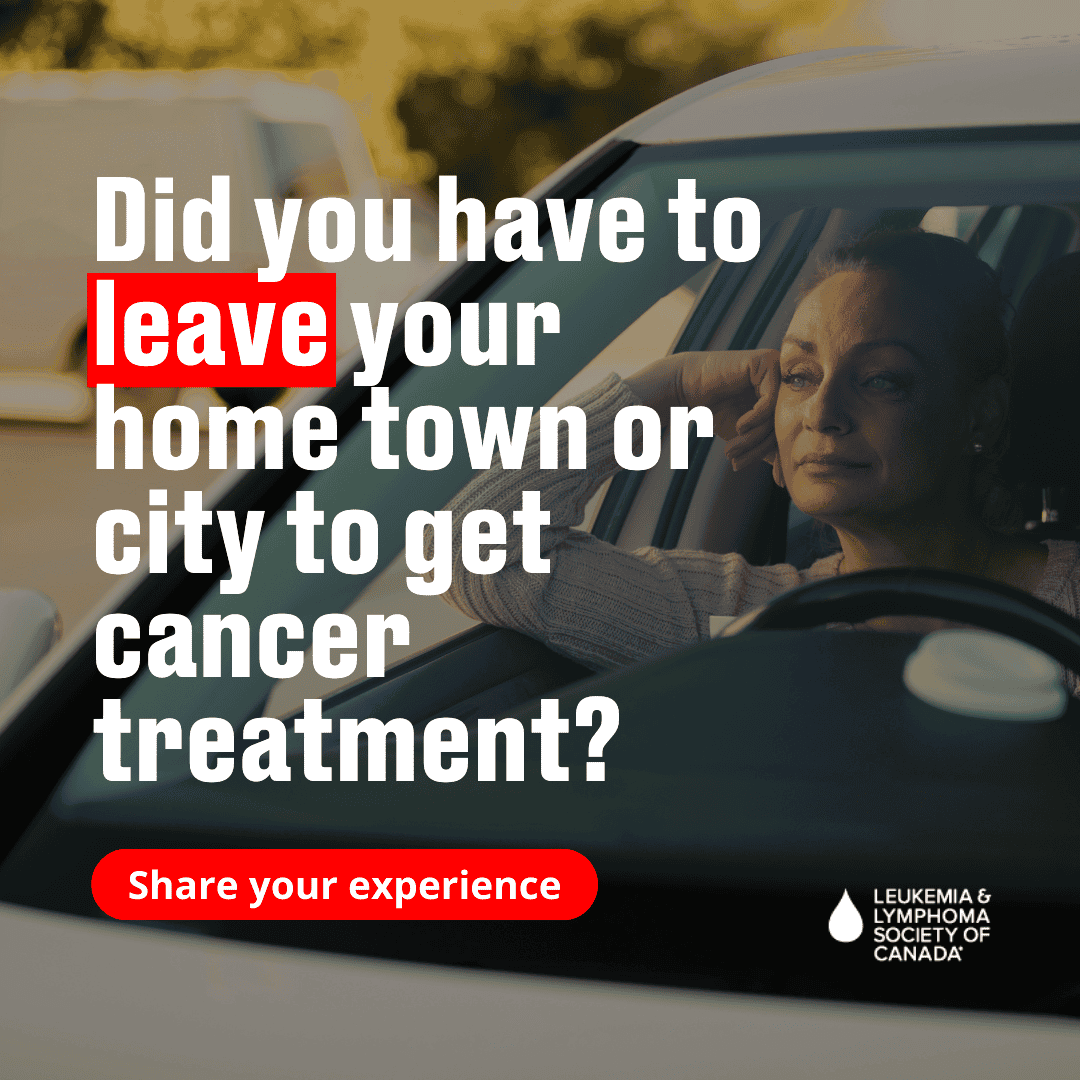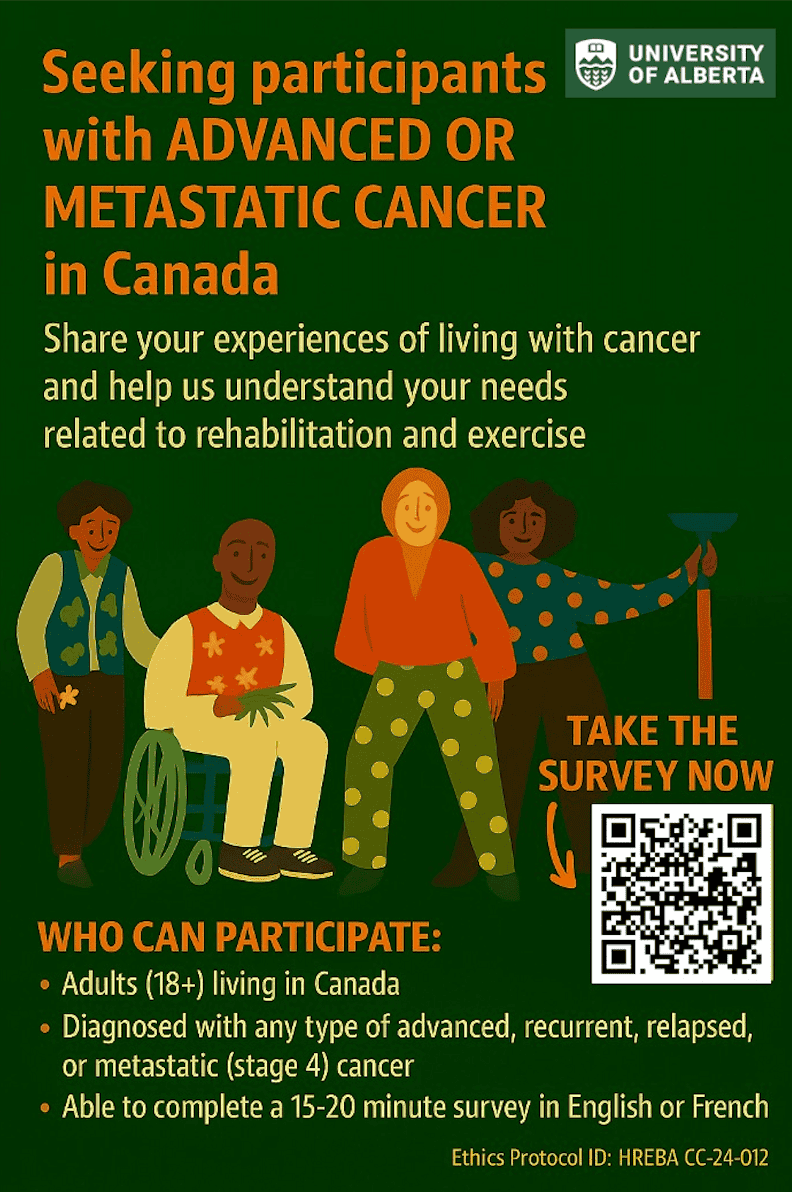Navigating the healthcare system
The Canadian Cancer Society is inviting people living with prostate cancer, who are or have been engaged in prostate cancer treatments (surgery not included for this specific study), and their caregivers to take part in a new national survey on treatment. This survey is led by the Canadian Cancer Society, in partnership with the Canadian Association of Nuclear Medicine, PROCURE, and Prostate Cancer Foundation Canada. This 20-minute survey is an opportunity to share the experiences of patients and their caregivers—how they navigate the healthcare system, the challenges they face, and the support they need. These insights will help guide decisions around access to treatments and diagnostics, influence policy change, and shape education and support programs that reflect the real needs of our community. The more people that take part, the more change we can make. Sasha Frost (She/Her) Public Engagement Project Manager/Gestionnaire de project, Engagement public Canadian Cancer Society / Société canadienne du cancer E Sasha.Frost@cancer.ca T (249) 288-0172 55 St Clair Avenue West, Suite 300 / 55, avenue St. Clair Ouest, bureau 300 Toronto, Ontario M4V 2Y7
Prostate Cancer Experience Survey
We invite individuals with prostate cancer and their caregivers to participate in a national survey exploring their experiences and needs. This initiative is led by the Canadian Cancer Society (CCS) in partnership with the Canadian Association of Nuclear Medicine (CANM), PROCURE and the Prostate Cancer Foundation Canada (PCFC).
The survey takes approximately 20 minutes to complete. Your input will help guide advocacy efforts to improve access to treatments and diagnostics, as well as support education, awareness, and initiatives that better serve the prostate cancer community.
Survey on Travel for Treatment
 Did you or a loved one (adult) need to leave your home town or city for cancer treatment in the past 5 years? If so, were your finances, employment, housing, education, family life, or social support impacted? Your voice is needed!
We are sharing an important survey from one of our partners in cancer advocacy, the Leukemia & Lymphoma Society of Canada (LLSC), who have circulated this survey already to individuals impacted by a blood cancer.
The survey, “Leaving Your Community for Cancer Treatment: Understanding the Impact,” is now open to Canadians, 18 years or older, who have been impacted by any type of cancer, other than blood cancer - and their caregivers.
Results, from feedback like yours, will increase awareness of the impacts of cancer treatment access, and generate discussion across Canada, including with authorities who make decisions about public funding for cancer drugs.
We urge you to consider taking this survey; your participation will provide much needed attention to access to cancer treatment in Canada. Thank you in advance
Did you or a loved one (adult) need to leave your home town or city for cancer treatment in the past 5 years? If so, were your finances, employment, housing, education, family life, or social support impacted? Your voice is needed!
We are sharing an important survey from one of our partners in cancer advocacy, the Leukemia & Lymphoma Society of Canada (LLSC), who have circulated this survey already to individuals impacted by a blood cancer.
The survey, “Leaving Your Community for Cancer Treatment: Understanding the Impact,” is now open to Canadians, 18 years or older, who have been impacted by any type of cancer, other than blood cancer - and their caregivers.
Results, from feedback like yours, will increase awareness of the impacts of cancer treatment access, and generate discussion across Canada, including with authorities who make decisions about public funding for cancer drugs.
We urge you to consider taking this survey; your participation will provide much needed attention to access to cancer treatment in Canada. Thank you in advance University of Alberta REACH Study

Invitation to Support a Research Study on Nutrition and Colorectal Cancer
 The purpose of this research project is to explore patients’, caregivers’, and healthcare professionals’ approach to and management of nutrition during colorectal cancer treatment.
To be eligible to participate in the study, individuals must meet the following criteria:
The purpose of this research project is to explore patients’, caregivers’, and healthcare professionals’ approach to and management of nutrition during colorectal cancer treatment.
To be eligible to participate in the study, individuals must meet the following criteria:
- Adults 18 years or older;
- Living in Canada;
- Patients diagnosed with colorectal cancer within the past five (5) years who have underwent or are currently undergoing treatment;
- Able to provide virtual consent.
Ethical AI: Using Machine Learning-Generated Reports and Interactive Chatbots to Support Patient Autonomy in the Context of Precision Medicine
We are looking for patients who have been diagnosed with cancer or those involved in providing decision support for cancer patients to participate in this study exploring the use of generative artificial intelligence (AI), such as conversational chatbots, to assist patients in understanding their clinical trial options.Participation involves a 1.5-hour virtual session where you will provide feedback on your interaction with an AI generated clinical trial match summary and a conversational AI chatbot. No prior AI experience is needed. You can also invite a support person to join the study. Both of you will be interviewed separately.For more information, please refer to the attached,-
the informed consent form that would apply to you as either a cancer patient or provider of decision-support for a patient.
If you are interested, please contact Natalie Yeh at natalie.yeh@uhn.ca for more information.Survey for Patients with Hodgkin Lymphoma
This survey is organized by Lymphoma Canada. If you were newly diagnosed with Hodgkin Lymphoma and have been treated with Brentuximab vedotin containing regimen (BrECADD), you can help by completing our survey. Lymphoma Canada is preparing a submission for Canada’s Drug Agency (CDA). This survey provides us with the patient input required for the submission. CDA uses this information to help them make recommendations to the provinces and territories regarding funding for new cancer drugs. The therapy that will soon be reviewed by the CDA is the Brentuximab vedotin containing regimen (BrECADD), which includes etoposide, cyclophosphamide, doxorubicin, dacarbazine, and dexamethasone, for newly diagnosed Hodgkin Lymphoma patients. You do not need to live in Canada to complete this survey. You can still participate in this survey if you are a Hodgkin Lymphoma patient who has not received this therapy. BY COMPLETING THIS SURVEY, YOU ARE PART OF THE PROCESS THAT MAY HELP PATIENTS GAIN ACCESS TO THIS TREATMENT IN CANADA. It should only take between 15-20 minutes of your time. Please share and help us spread the word. Thank you for your support.
Sedentary Behaviour Study for Patients

Sedentary Behaviour Study for Caregivers

Nova Scotia Health Breast Cancer Survey
Researchers at Nova Scotia Health want to hear from female breast cancer survivors who are experiencing issues with sexual function after completing their cancer treatment. The researchers want to explore whether and how women seek help for these issues and investigate the impact these issues have on their lives. Issues with sexual function are common in breast cancer survivors after their initial curative treatment. These issues may be characterized by vaginal dryness, painful intercourse, hot flashes, decreased sexual interest, decreased arousal, difficulty attaining orgasm, and poor body image. Though these issues are common after breast cancer treatment, many women face barriers when attempting to seek care and support. In order to improve access to care, we need to have a better understanding of the current help-seeking strategies used by breast cancer survivors, as well as how issues with sexual function impact their daily lives. The researchers hope the findings from this study will inform future research on the development of interventions that improve holistic care for female breast cancer survivors after cancer treatment. You are eligible to participate in this study if you:
- are at least 18 years of age;
- reside in Canada
- are female
- have been treated for breast cancer in the past 10 years.
Improving communication about low risk ductal carcinoma in situ (DCIS)
Dr. Anna R Gagliardi, Senior Scientist at the University Health Network, is conducting a Canadian Cancer Society funded study to identify non-cancer labels for Ductal carcinoma in situ (DCIS), and is inviting you along with other women from across Canada who had DCIS, to shape recommendations on the labels, language, and other strategies that physicians should use to improve communication about DCIS. This may reduce confusion and anxiety among women with low-risk forms of DCIS. This study involves completing a two-part survey that, in total, will require about 20 minutes of your time over the next month. First, read the two documents attached: a one-page summary of our research and a list of the survey items. Then, if you are interested in participating or wish to learn more about the study, please contact the study coordinator Mavis.Lyons@uhn.ca. Participation in this study is completely voluntary. Infographic Information Sheet
Nuance: Inequity in Aging & Cancer
This study is put on by the Princess Margaret Cancer Foundation The overall objective of this study is: - To gain a better understanding of the factors impacting access to cancer care and clinical research for racialized older adults - To identify strategies to address disparities in these areas The Why Cancer predominantly affects older adults - US data show that there are disparities based on age, race, and sex/gender with regards to treatment outcomes and clinical trials participation - Black persons particularly, and to a lesser extent Asians and Hispanics, do worse than Whites - There is No systematic collection of data on race or gender in Canada - “Until we measure it and understand it, we cannot fix it” Who are we looking for to participate? Older adults (60+ years) who identify as Black, South Asian (e.g. India, Pakistan, Bangladesh), OR East Asian (e.g. China, Japan, Korea, Vietnam) AND }Have had a cancer diagnosis in the last 10 years What do I do if I want to participate? - Let us know! (see below for contact info) - Review and sign consent form - Fill out an online OR paper survey asking about your experience accessing cancer care and clinical research - About 15-20 minutes to complete - $10 gift card to thank you for your participation - All responses will be treated confidentially - Optional interview in a future phase - If you are interested in participating, please email Sara Durbano to receive links to the study consent form and survey (online or paper) sara.durbano@uhn.ca Regards Shabbir Alibhai
Broadstreet Cancer Treatment Survey
Dear member: We are conducting a new research study in which you may be interested in participating. We are aiming to understand the thoughts and opinions of Canadians on how new cancer treatments are evaluated, and how decisions about the availability of new treatments should be made. We will be conducting virtual interviews with 20-25 interested and eligible individuals. Virtual interviews will occur in March and April 2024, and participants will be compensated $100 for their time and expertise. To participate you need to:
- Be 18 years of age or older
- Be currently undergoing or having had past treatment for stage I-III breast cancer; stage I-III non-small cell lung cancer; limited stage small cell lung cancer; or stage A or B liver cancer
- Live in Canada
- Be fluent in English
- Complete an eligibility questionnaire about cancer diagnosis and treatment
Interview Opportunity For Adults With Metastatic Urothelial Carcinoma (Bladder) Cancer
Click here for full details CONTACT: dlambkin@marketresearch2go.com
Seeking patients who had low-risk cancer for a research study requiring one telephone call
This study is commissioned with the University Health Network in partnership with the Canadian Cancer Society Background: Due to more screening, many more people are diagnosed with abnormal cells with a very low risk of ever turning into cancer. Many patients undergoing treatment for these abnormal cells believe they have cancer, which causes anxiety and reduces quality of life. Little prior research has explored how to improve communication about “low-risk” cancers so that patients better understand their diagnosis. Study purpose: Identify ideal ways to name and discuss low-risk cancers by asking patients and doctors about the names they prefer for low-risk cancers of the breast, cervix, bladder, thyroid, and prostate, and the reason for those preferences. You can participate if you: ? Are 30 years of age or older ? Were diagnosed in the last 5 years with abnormal cells in any of the following body parts that required only regular monitoring because of a very low chance of ever turning into cancer, or if treated, would not likely recur: o Breast (only ductal carcinoma in situ) o Cervix o Bladder o Thyroid o Prostate ? Live anywhere in Canada ? Can understand and speak English language What you will be asked to do: ? Read and sign an online consent form ? Participate in a single telephone interview of about 20 minutes ? We will ask for your opinion about the words used to name and describe abnormal cells in the breast, cervix, bladder, prostate, or thyroid What we will give you: ? After you participate in the telephone interview, we will send you compensation ? When the study is done, we will send you a summary of the results To express interest or ask questions: The research study is being conducted by Dr. Anna Gagliardi from the University Health Network (UHN) in Toronto with funding from the Canadian Cancer Society. If you are interested in participating or wish to learn more about the study, please contact the study coordinator: Mavis. Lyons@uhn.ca. Please note that information sent by email may be accessible by external parties and therefore not entirely secure. Please do not communicate personal sensitive information via e-mail.
SEAMLESS Study: A Smartphone App-based Mindfulness Intervention for Cancer Survivors
This study is commissioned by the University of Calgary and Alberta Health Services Click below for more information: SEAMLESS Flyer_Apr2023 SEAMLESS Email Flyer
Lung Cancer Screening Values (LCSV) study team at McMaster University
We are recruiting 55 and 85-year-olds who can converse in English for a research study. The purpose of this study is to investigate Ontarians’ values, attitudes, and beliefs about lung cancer screening. Participants will be compensated $20 for completing an interview in person (Hamilton, ON), by telephone or video call. If you are interested in participating, please fill out the eligibility survey here: https://dfmgp.mcmaster.ca/surveys/?s=MXFWX8483DJ88RLW We hope to learn what you think about the importance of lung cancer screening, who you think should be screened, and your perspectives on the benefits and harms of lung cancer screening. Your participation can help advance our thinking about lung cancer screening in order to make a potential future lung cancer screening program in Ontario fair, effective, and an efficient use of health care dollars. This research study is part of a doctoral thesis by Manisha Pahwa, a Ph.D. student at McMaster University, and has been reviewed by the Hamilton Integrated Research Ethics Board (project #8310)”
Bladder Cancer Patient Feedback
Bladder Cancer Canada is looking for patients to provide input for 4 different studies, including two studies directly conducted by doctors.These studies are looking to gain insights from Canadians diagnosed with advanced (metastatic) bladder cancer and muscle-invasive bladder cancer to better understand their personal experiences from the time of diagnosis and beyond.Selected participants will be invited to participate in a virtual meeting or complete a survey to share their perspectives with other attendees and/or researchers. Compensation is provided for selected studies.We would truly appreciate it if you could inform any bladder cancer patients of these studies.Anyone interested can connect with Michelle Colero, who can provide more information - michellec@bladdercancercanada.org. Evaluating Psychosocial Needs of Retinoblastoma Patients and Families
Dr. Helen Dimaras (Scientist and Director of Global Eye Health Research, The Hospital for Sick Children, Toronto) is?partnering with researchers, clinicians, and retinoblastoma patients and families to develop a study that will uncover the unmet psychosocial needs of Canadian retinoblastoma patients and families.
Fear of Cancer Recurrence
This is a doctoral research project done by Jani Lamarche, PHD candidate in clinical psychology at the University of Ottawa. Lamarche is looking to adapt and provide a group intervention aimed at reducing fear of cancer recurrence in family caregivers of cancer survivors. To participate, email jlama023@uottawa.ca Fear of Cancer Recurrence_Recruitment Flyer
University Of Liverpool Research Participants Call Out
The University Of Liverpool is seeking participants for research into how young women of color experience hair loss as a result of chemotherapy for breast cancer. Are you a woman of color between the ages of 21 and 45 who experienced hair loss as a result of chemotherapy for breast cancer (more…)
University of Calgary Exercise for Cancer to Enhance Living Well Health and Wellness Lab
Exercise for Cancer to Enhance Living Well (EXCEL) is a five-year nationwide project to increase the accessibility of exercise programs for rural and remote cancer survivors, (more…)
McGill University LymFit Exercise study.
Researchers at McGill University (Montreal, QC) are leading an exercise intervention study for young adults with lymphoma to get them to engaged in physical activity and increase their overall fitness and quality of life. (more…)
Bladder Cancer Canada Bladder Cancer Patient Insights Survey
Bladder Cancer Canada is looking for bladder cancer patients and caregivers to complete their to ensure they are supporting patients in the best way possible. (more…)
EXCEL Program: Exercise for Cancer to Enhance Living Well
The EXCEL program is open to all adults affected by cancer who do not have access to exercise oncology programs in their area (which is most as there are very few established exercise oncology programs in Canada). We'd love for more Young Adults to participate in the program. Programs start every 12 weeks in Fall (sept start), Winter (Jan start), Spring (Apr start), and summer (July start, shorter program). For more info, visit this link: https://kinesiology.ucalgary.ca/labs/health-and-wellness/research-projects/excercise-cancer-enhance-living-well-excel EXCEL_Poster_ParticipantAction_202110 ~
RECRUITMENT FOR A RESEARCH STUDY: Managing Your Caregiver Worries
Do you worry about your loved one’s cancer coming back? Do you worry weeks before your loved one’s follow-up appointments? Do your worries about your loved one’s cancer coming back cause you distress or affect your daily life? If so, a brief online group study is being offered to address these worries. (more…)
Symptom Tracking & Management to Improve Cancer Care
e-IMPAQc is inviting primary support persons (caregivers) to individuals diagnosed with cancer to an online focus group or one-on-one interview for a research study and would like to hear from a large and diverse group.
We invite you to share your needs and challenges as the primary support person to a family member or friend diagnosed with cancer by participating in two 90-minute online focus groups and one 120-minute online focus group with the research team of Sylvie Lambert of McGill University. Your feedback and suggestions will help the e-IMPAQc team develop a mobile application to provide cancer caregivers with educational materials and resources specific to your needs. Participants receive $35 pr workshop as a thank you for their contribution. For more information contact the team at e-impaqc_postt@mcgill.ca and visit https://e-impaqc.com/en/~Call for Stories about Dealing with Side Effects of Prostate Cancer Treatment
Urinary incontinence and erectile dysfunction are two very common side effects of treatments for prostate cancer. They frequently persist for months or years after treatment. These side effects can seriously worsen patients’ quality of life. CCSN is undertaking a project to raise awareness of the need for rehabilitation services for prostate cancer survivors who experience these life-changing side effects, and to help make sure patients know about rehabilitation options that already exist. As part of this project, we are looking for stories from prostate cancer patients and survivors about dealing with incontinence or ED after treatment. These stories will be published in our updated prostate cancer section on our website. If you want to contribute a story, send us an email at info@survivornet.ca.
Call for Stories of Experience with COVID-19 and Cancer
CCSN's surveys on the impact of the COVID-19 pandemic on access to cancer care have given us a lot of information about the numerous ways in which the pandemic has caused difficulties for cancer patients, caregivers, and pre-diagnosis patients. However, we're also interested in learning more specifically about the experience of cancer patients who were ill with COVID – fears and concerns, interactions with the healthcare system, and any other challenges or difficulties. If you are someone who has had cancer and you got COVID, and want to share your story, send us an email at info@survivornet.ca.
Lung Cancer Support Survey
The Lung Health Foundation is committed to delivering a support service to Lung Cancer patients and caregivers that is current, relevant and meaningful. With that goal in mind, they have created a survey to gather input and insights from those with lived experience to increase our understanding of the lung cancer journey, including diagnosis, navigation of care and gaps in support. This survey will take a few minutes to complete. ~





